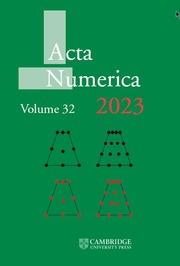Article contents
Ensemble Kalman methods: A mean-field perspective
Published online by Cambridge University Press: 01 July 2025
Abstract
Ensemble Kalman methods, introduced in 1994 in the context of ocean state estimation, are now widely used for state estimation and parameter estimation (inverse problems) in many arenae. Their success stems from the fact that they take an underlying computational model as a black box to provide a systematic, derivative-free methodology for incorporating observations; furthermore the ensemble approach allows for sensitivities and uncertainties to be calculated. Analysis of the accuracy of ensemble Kalman methods, especially in terms of uncertainty quantification, is lagging behind empirical success; this paper provides a unifying mean-field-based framework for their analysis. Both state estimation and parameter estimation problems are considered, and formulations in both discrete and continuous time are employed. For state estimation problems, both the control and filtering approaches are considered; analogously for parameter estimation problems, the optimization and Bayesian perspectives are both studied. As well as providing an elegant framework, the mean-field perspective also allows for the derivation of a variety of methods used in practice. In addition it unifies a wide-ranging literature in the field and suggests open problems.
Information
- Type
- Research Article
- Information
- Creative Commons
- This is an Open Access article, distributed under the terms of the Creative Commons Attribution licence (http://creativecommons.org/licenses/by/4.0/), which permits unrestricted re-use, distribution, and reproduction in any medium, provided the original work is properly cited.
- Copyright
- © The Author(s), 2025. Published by Cambridge University Press
References
- 5
- Cited by

